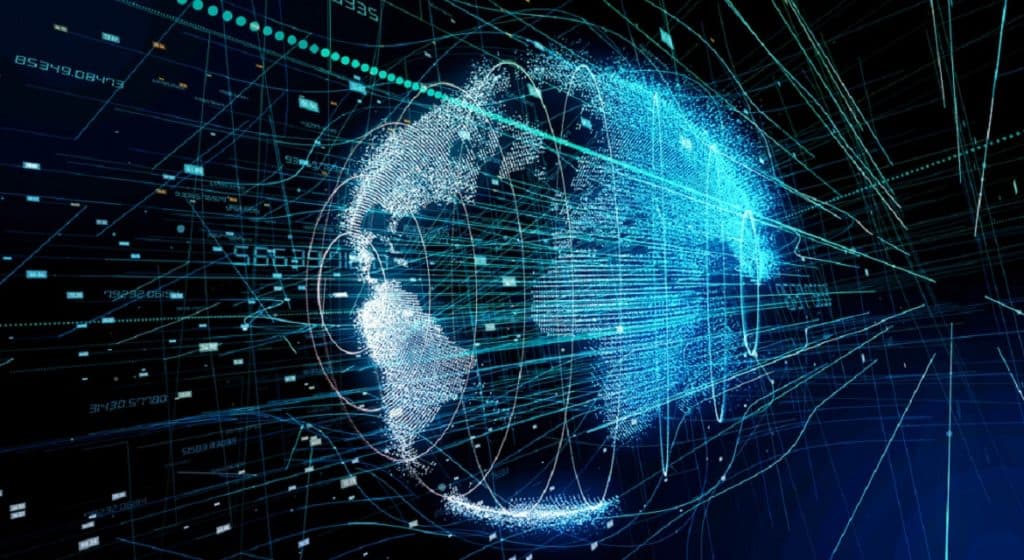By Rana Danish Nisar
What follows is an analysis of how the transition from oil to data has impacted the structure of international politics.

The cliché “data is the new oil” now represents the value of information as a result of its increasing significance in modern society. Oil’s importance to the growth and improvement of human civilization has been well recognized for some time. Data has essentially become an indispensable tool for many fields’ R&D, commerce, and policymaking. Like crude oil, the value of data is not fully realized until it has been extracted, treated, and distilled. Data can be generated from a variety of sources, including social media sites, online stores, mobile apps, sensors, and IoT gadgets. In today’s information-driven economy, businesses can’t afford to ignore the plethora of data at their fingertips. More and more companies understand the value of data and the possibilities it offers.
A company’s productivity, efficiency, ability to meet consumer needs, and competitive position can all improve when decisions are grounded in data. Online retailers use data analytics to track customer activity in order to modify product recommendations, while healthcare providers examine patient information to better predict illness outbreaks and give preventative care. As the use of AI and ML has grown, so has the value of data.
In order to effectively train models and generate reliable predictions, these systems require massive volumes of high-quality data. In order to create effective AI algorithms, businesses need access to huge and varied datasets. However, similar to the environmental and ethical considerations brought on by the oil industry, data poses its own set of difficulties. There are privacy and security concerns associated with the collection, storage, and analysis of individual data. The misuse of information can result in security leaks, stolen identities, and other invasions of personal privacy. The public’s trust must be preserved, and the benefits of data-driven innovation must accrue to society as a whole, making responsible and ethical data management essential.
Data has become a strategic asset in the information age, frequently compared to oil for its ability to influence economies and governments. This comparison was inspired by the notion that data, like oil, must be extracted, refined, and distributed in order to be completely utilized. The phrase “data as the new oil” has acquired traction at the intersection of technology, economics, and geopolitics. Once a pointless byproduct of human endeavors, data is now a highly valued commodity. It has value due to its ability to cast light on problems, inspire new ideas, and assist businesses in making better decisions. Artificial intelligence (AI) and machine learning (ML) algorithms rely heavily on data, which facilitates advancements in numerous other fields, such as healthcare, finance, transportation, and defense. Businesses and governments can use data to increase efficiency, anticipate market trends, and gain a competitive advantage. Unlike hydrocarbon deposits, data reserves are extracted in a variety of ways; these include user-generated content, social media activity, e-commerce, and sensor-generated data from IoT devices.
The tech industry and social media platforms have amassed vast amounts of user data, granting them considerable sway in a variety of social spheres. Google, Facebook, Amazon, and Alibaba have all attained the status of “data titans” as a result of their political and commercial use of vast troves of consumer data. To eavesdrop on their subjects, learn about the world, and exercise authority, governments rely heavily on data today. Techniques of domestic and international mass surveillance enable governments to monitor citizens, identify threats, and influence public opinion. Using data collection and analysis, China’s Social Credit System, for instance, monitors citizen activity and assigns scores based on how responsible they are with money and other resources. Authoritarian regimes also use data-driven monitoring capabilities to suppress dissent and preserve political order. The reality that data has evolved into a crucial component of economic power is directly responsible for the emergence of digital economies. With access to vast quantities of data, businesses can create innovative new products, acquire consumers, and eventually dominate their industry. When so much wealth and power are concentrated in so few hands, there is a risk of monopolistic or anti-competitive behavior.
Governments are placing greater emphasis on data protection, privacy regulations, and antitrust measures in order to ensure equal opportunity in the marketplace and prevent the abuse of data for competitive advantage. The custody and control of data has evolved into a crucial factor in international power struggles. In light of the growing significance of data-driven technologies, nations are striving to bolster their capabilities and protect their data sovereignty. As a result of the realization that AI could considerably impact their GDP, military power, and technological prowess, countries have increased their competition to become AI leaders. Data localization laws and restrictions on cross-border data transfers have evolved as a means of safeguarding national interests and exercising control over data resources.
The diplomatic process now incorporates discussions between nations regarding data issues. Agreements on data sharing, cybersecurity, and privacy are formulated in order to enhance international cooperation and reduce the likelihood of conflicts resulting from diverse approaches to data governance. Nations are discussing global data governance frameworks in an effort to establish rules and standards for the governance of data access, protection, and use. While striking a balance between competing national interests, the objective is to promote cooperation and assure the ethical use of data.
The United States and China have both developed as major global powers, and their rivalry spans many areas, from economics and technology to geopolitics. Data-related issues have become increasingly central to this competition, which has serious consequences for the global order. Both nations value data highly strategically and are working to fully realize its possibilities. The United States boasts a large number of data-generating and data-using IT enterprises, and has a long history as a technology leader. Data analytics and artificial intelligence have been instrumental in the meteoric rise to worldwide dominance of companies like Google, Amazon, and Facebook. However, China has emerged as a technological superpower very quickly. China’s huge population and prosperous digital economy mean the country produces copious volumes of data. The Chinese government has laid out ambitious objectives to become a global leader in artificial intelligence and other new technologies because of the power these technologies have to boost the economy and cement the country’s position in the international arena. Multiple dynamics distinguish the US-China data competition: Both nations see data as crucial to the advancement of cutting-edge fields like artificial intelligence, quantum computing, and fifth-generation wireless. To stimulate innovation and acquire a competitive edge, they spend substantially on R&D, on talent cultivation, and on creating favorable regulatory frameworks.
On data governance and legislation, the United States and China have opposing positions. Regulations such as the California Consumer Privacy Act (CCPA) and the General Data Protection Regulation (GDPR) reflect the United States’ commitment to privacy protection and individual rights. In contrast, China takes a top-down strategy, with the government collecting and monitoring citizens’ data extensively. Disputes between the United States and China over intellectual property rights, market access, and data localization requirements highlight the crucial role data plays in international trade and economic competition.
As a result of this rivalry, data-related products and services are increasingly subject to restrictions and tariffs. Data is seen as a tool for geopolitical influence and national security by both the United States and China. They compete for control of essential infrastructure and influence over setting international standards for technologies. Cybersecurity, data sovereignty, and surveillance capacities are all areas where the rivalry is evident. Data security, intellectual property theft, and privacy issues have all been brought up as a result of the data competition between the United States and China. In today’s globalized and linked world, governments, businesses, and civil society organizations are all trying to figure out how to manage data flows, develop fair standards, and protect individual rights.
The United States, China, and the rest of the world need to find a middle ground in this race that prioritizes good data governance, protects personal data, and provides everyone with the chance to reap the rewards of data-driven innovation. Managing this rivalry and tapping into data’s revolutionary potential for the development of societies around the world calls for cooperation, dialogue, and the establishment of international rules and standards.
Data’s potential as the new oil will have far-reaching effects on the balance of power around the world. Countries are beginning to see that data is not just a valuable economic resource, but also a geopolitically advantageous strategic tool. Some important trends in the future of data in international politics are as follows: Economies can become dominant in the world if their governments have access to large volumes of data and sophisticated analytical tools. Economies, capital, and human capital can all benefit from data-driven sectors like the tech, banking, and e-commerce industries. Those countries that protect citizens’ personal information while also encouraging data innovation will likely prosper. The use of data in national security and military policies is now commonplace. Governments are aware of the value of data for various intelligence, cyber, and surveillance purposes. Large-scale data collection and analysis can shed light on the motives and strategies of foreign states. Using this information, one can gain an advantage in strategic decision-making, influence public opinion on a global scale, and build geopolitical narratives.
So, data ownership and control are now major factors in international relations. More and more nations are claiming ownership of their residents’ data and establishing laws to prevent its export or theft. In order to provide governments more control and access to data, some countries have passed legislation requiring firms to keep and process data within national boundaries. This development has sparked discussions about how best to ensure the security of personal information while allowing for the free exchange of ideas across national boundaries. The development of cutting-edge technologies like AI, ML, and IoT will have a profound impact on the future of data. Those countries who are first to market with these solutions will be at a considerable economic and strategic advantage.
Leadership in technology is essential for advancing the state of the art, setting industry standards, and influencing international policies on data usage, privacy, and ethics. Developing global governance frameworks and conventions to handle the benefits and difficulties posed by the advent of data as a major resource is urgently needed. There has been a rise in the profile of conversations around data privacy, data protection, cybersecurity, and the ethical use of data. Data governance norms are being developed through international cooperation, agreements, and standard-setting agencies to ensure that data is used ethically, openly, and lawfully. However, the future of data as the new oil comes with ethical implications and concerns that must be taken into account. For data to be used in a fair, transparent, and balanced way, concerns including privacy, data breaches, spying, and algorithmic bias must be addressed.
Data will continue to be the new oil in the future, and this has far-reaching consequences for international affairs. Data’s economic, geopolitical, and technological elements all influence how nations compete, cooperate, and exert influence in the digital age. How successfully governments are able to negotiate with these forces will determine whether or not the revolutionary power of data can be harnessed and whether or not the future of the global digital environment can be defined.
Author: Rana Danish Nisar – The author holds high academic credentials in the field of international relations. He has deep expertise in security, defense and military studies.
(The views expressed in this article belong only to the author and do not necessarily reflect the views of World Geostrategic Insights)







